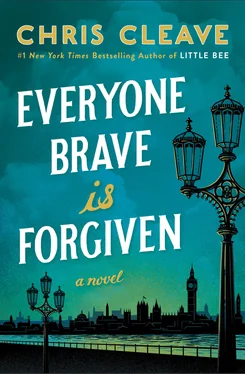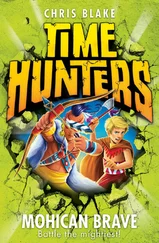Mary’s heart caught. “I’m sorry.”
“Oh, it isn’t your fault. Come on, let’s go for that tea.”
Soon the sirens howled up to their huge C-sharp and swooped down to A again to start their cycle. The first bombs fell and the night was underway, and they were sent out to the first casualties.
Clive was drunk before they even began. Huw was white with fatigue. They picked up two deceased and were halfway through their first run to the mortuary when Mary took a corner and both the bodies on the roof flew into the street. Clive and Huw had forgotten to strap the stretchers down. The men worked together to recover the first body, making a count of one, two, three, lift, but they discovered — after two attempts and a long interval of confusion in the slits of the ambulance’s headlights — that Clive had been lifting the arms of one corpse and Huw the legs of the other. Mary watched them curse and begin again.
As softly as she could, she said, “I’ve been writing to Alistair.”
Hilda looked straight ahead and said nothing.
“I’m sorry,” said Mary. “If that counts for anything.”
“You’re sorry…”
“I waited for what I thought was a decent time. I wouldn’t have written if I thought that you and he were hitting it off.”
Hilda still looked straight ahead. “Who wrote first? You, or him?”
Mary rested her forehead on the wheel. “I don’t blame you for being angry.”
“ ‘Angry’ isn’t the word. You’ve done this since we were children.”
“I know. I’m sorry, Hilda.”
In the useless headlights the men got one body back on its stretcher. They lifted it unevenly and the corpse rolled off again.
“At every party you left with the nicest man. And whatever second-choice boy I kissed was closing his eyes and thinking of you.”
“Well it won’t happen again, I promise.”
“Oh, so Alistair is the last one you’ll take from me?”
“I didn’t want it to happen.”
“When did you know?”
“When I took his bag to the station.”
“So you did kiss him.”
“No.”
“Did you hold hands?”
“No. I was with Tom, remember? You don’t know what it was like.”
“Why? Do you suppose I’ve never been in love? I feel these things, Mary. Hopeless as I am, I feel them. But you are always there — aren’t you? — to rescue me from love.”
Mary closed her eyes. “I’m sorry.”
Hilda said nothing. A swing tune played at the edge of Mary’s awareness, somewhere in the white noise: a phantom melody. Nobody slept.
When the corpses were loaded again, Mary drove to the morgue. Now it took an age to get everything off the roof, since the men had made doubly sure with the strapping. Their cold hands struggled with the knots. With an effort Mary kept her head from drifting down to the wheel again.
“It’s getting harder,” said Hilda.
“What is?”
“To believe that this is endurable.”
Mary supposed she either meant their friendship, or the bombing. Tens of thousands were dead now, and everyone left was sickened. This was something about war that they did not warn one of: that death was an illness of the living, a cumulative poison.
When Clive and Huw had got the empty stretchers on the roof at last, Mary drove back to the church. They were all too weary to go down into the shelter. They listened to Tom’s wind-up gramophone, which Mary kept in the ambulance now. Clive passed a bottle around. They worked at getting drunk enough to be able to do the job, without being so drunk that they couldn’t. Through the windshield, in the orange glow of fires, the rubble stretched to the limit of sight.
“It’s all right for you,” said Hilda. “But I don’t have anyone.”
“You will. You’ll see.”
“Listen to yourself,” said Hilda.
The sadness calcified.
The ARP controller tapped on the ambulance window with a fresh address. Mary parked the gramophone’s needle and drove. Hilda rested her head against the passenger window and watched the ack-ack gliding up.
The incident was in Farringdon, past their usual patch, and when they got there the scene was already busy with ambulances and fire crews. An office building had come down on top of the shelter beneath it, and the wreckage was ablaze. The crews had worked an access route down into the shelter, and Clive and Huw joined them to bring out the wounded. The firemen played hoses on the steaming rubble around the access tunnel, and the stretcher parties were coming out drenched.
Hilda took her medical bag and went down without a word. After a minute Mary couldn’t bear it and went down after her. The tunnel began under a bowed steel lintel and tended steeply down a stairway that had been filled by rubble when the building collapsed. It had been excavated sufficiently to permit passage if one doubled over. Freezing water poured from the roof of the tunnel.
The dim light from the flames outside surrendered to a darkness broken by battery lamps every few yards. Mary’s knees scraped on the sharp rubble and her tin hat slammed against a beam, so hard that she was stunned for a moment. Shouts were coming up from the darkness. She forced herself to continue.
The tunnel opened out into what Mary took to be a large water tank, in which for some reason the men of the rescue crews were wading thigh-deep by the bewildering light of torches.
“Where’s the shelter?” she asked a rescuer.
“This is it.”
She must have looked blank, because he said: “It’s water from the fire hoses. Flooding.”
The survivors seemed all to have been brought out — the people down here were rescuers — and Mary saw them going down into the black water, plunging in and staying under for long moments before surfacing with gasps.
Hilda came over to her. “They’re only looking for bodies, I’m afraid. Let’s go back up.”
Mary took a step forward and a heavy weight came down on the back of her legs, pushing her down. She knelt, chest-deep. Hilda took her arm to help her up. Mary tried to stand but found that she couldn’t. In the cold water her breath came in gasps.
Hilda held her under both arms. “Oh do get up, won’t you? We’re all exhausted, you know.”
Mary felt down her legs with her hands. A heavy beam — it felt like metal — was pressing into the angle of her knees. Her kneecaps were pinioned to the uneven rubble of the floor. She strained against the metal. It wouldn’t move at all. There was no effect except to grind her knees into the rubble, which hurt. She reached down and felt along the beam, left and right, but it stretched away farther than the span of her arms.
A rescuer splashed up and shone his torch on Mary. “All right here?”
“I’m very sorry,” she said. “I seem to be stuck.”
She smiled, which was all one could do when embarrassed.
The rescuer had Hilda hold the torch while he knelt beside Mary and tugged along the length of the beam. “It’s good and stuck, isn’t it? Are you in pain?”
“Only when I try to move. Which is silly, isn’t it?”
“Well you just stay calm, darling, while we get this sorted out.”
“Thank you very much,” said Mary. Until the man told her to stay calm, it hadn’t occurred to her that there might be reasons not to.
Hilda held her hands. More rescuers came and began to duck under, bringing up a brick here and a piece of bar there, but whatever was trapping her was too heavy to shift. Mary gathered that the beam was set in concrete at both ends, and the concrete lodged under obstructions. She took in the men’s nervous voices and the efforts they made not to alarm her.
They became more methodical, searching underwater obstructions with their fingertips, trying to understand how to dislodge the beam. The sound of pouring water was loud in the sudden calm. Hilda undid her hair clips and fixed Mary’s hair back to stop it going in her mouth.
Читать дальше












